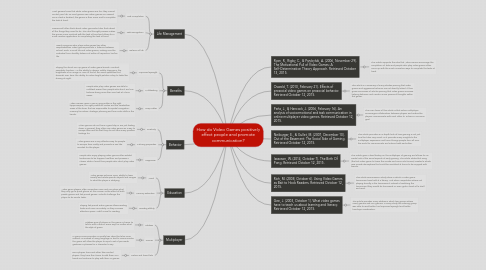
1. Life Management
1.1. Task Completion
1.1.1. Most gamers know that while video games are fun, they cannot control your life, so most gamers see video games as a reward once a task is finished; the gamer is then more avid to complete the task at hand.
1.2. Task Recognition
1.2.1. Gamers will often think about video games,but also think about all the things they need to do. This dual thought process makes the gamer more involved with the task at hand and allows for a more creative application to completing the task at hand.
1.3. Balance of life
1.3.1. Nearly everyone who plays video games has other responsibilities. video games promote a balance between school, work, a social life and video games; making sure the individual has a healthy balance of within all aspects in his/her life.
2. Benefits
2.1. Improved eyesight
2.1.1. Playing the shoot-'em-up genre of video game boosts "contrast sensitivity function," or the ability to discern subtle changes in the brightness of an image or. One of first of the visual aptitudes that diminish over time, the ability to notice bright patches is key to tasks like driving at night.
2.2. Multitasking
2.2.1. People who play video games are able to multitask easier than people who don't and can balance doing more than one task at a time easier.
2.3. Gray matter
2.3.1. Video Games cause a rise in gray matter in the right hippocampus; the right prefrontal cortex and the cerebellum areas of the brain that are responsible for spatial navigation, memory formation, strategic planning and fine motor skills in the hands.
3. Behavior
3.1. Positivity
3.1.1. When gamers do not have a great day or are just feeling down in general, they often use video games as a way to escape their real life that they do not have many positive feelings for.
3.2. Calming properties
3.2.1. Video games are a very effective way for people to escape from reality and promote a zen like mindset for the player.
3.3. Happiness
3.3.1. People who enjoy playing video games often exhibit tendencies to be happier, healthier and possess a clearer state of mind than people who don't play video games.
4. Education
4.1. Visual
4.1.1. Video games enhance ones ability to learn visually and relate specific objects and images to what the player is studying.
4.2. Memory Retention
4.2.1. Video game players often remember more and can retain what they only got a quick glance at, this is seen as the effect of both puzzle games and fast paced games, as both challenge the player to do similar tasks.
4.3. Reading ablility
4.3.1. Playing fast paced action games allows reading faster and more accurately, as they increase attention spans, a skill crucial to reading.
5. Multiplayer
5.1. Lobbies
5.1.1. Lobbies give all players in the game a chance to talk to each other in some way, no matter what the style of game.
5.2. Games
5.2.1. In game communication is usually less direct but also more satirical, as instead of using language or text to communicate, the game will allow the player to input a set of pre-made gestures or phrases for a character to say.
5.3. Parties and friend lists
5.3.1. Once players have met other like minded players, they have the choice to add them as a friend and continue to play with them in games.
